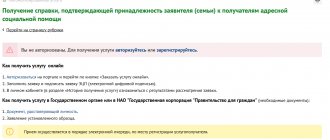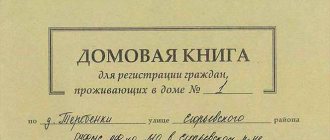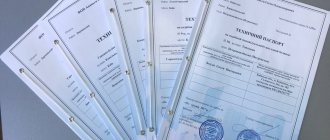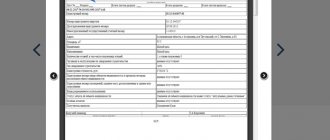What kind of paper is this about non-participation or participation and why is it needed?
One of the main documents required for those who wish to obtain ownership of residential premises is a certificate of non-participation/participation in privatization (certificate in form No. 2).
The need for the document is due to the restriction of the right to participate in the gratuitous transfer of state/municipal property.
Anyone can become the owner of an apartment through privatization only once. It does not matter whether the citizen is the owner of another home. An exception is for children under 18 years of age, since they can participate in privatization twice. Before and after adulthood.
In order to obtain ownership of the housing that he occupies under a social tenancy agreement, the applicant must prove that he has not previously exercised the right to privatization, including at other places of residence.
Certificates must be issued for all privatization participants.
Form and application for privatization
An application for privatization of an apartment must contain the following information:
- address of the institution to which the application is submitted;
- FULL NAME. and the actual address of the person applying for privatization;
- actual address of the apartment subject to the privatization procedure;
- list of documents that are attached to the application;
- date of application;
- FULL NAME. and the signature of citizens participating in privatization.
forms from here.
Where can I get archival paper?
If the residential premises in which you live were allocated to you before 1991, a certificate of non-participation in privatization is not required.
The document can be obtained from various authorities:
- BTI.
- Rosreestr.
- Multifunctional center.
- Municipal district administrations in small towns and settlements.
- Real Estate Department - in large cities.
You can submit an application in person, by mail, including electronically, or through State Services.
If you changed your registration at your place of residence, lived at different addresses, and also if the housing for which you are applying was received in the period from 1991 to 1998, you should contact the BTI for a certificate.
Since 1998, the functions of registering property have been assigned to the Federal Service for State Registration, Cadastre and Cartography. Therefore, for information after 1998, you need to contact the territorial office of Rosreestr.
These departments contain information about any real estate owned by a specific person and on what basis the ownership was registered.
You can apply for the document in person, by mail or with the help of a representative.
You can also contact the Multifunctional Center for information about non-participation in privatization. Receiving documents through the MFC is by far the most convenient way. You can make an appointment on the official website or by phone. Photocopies of documents can be made by the operators themselves.
Through the MFC or the regional branch of Rosreestr, you can issue an extract from the Unified State Register of Real Estate, which contains data on a specific property. Citizens who have an electronic digital signature can contact Rosreestr on the department’s website.
If the applicant has not changed his place of residence since 1991, he can contact the Administration or the Real Estate Department.
Often, the privatization department independently requests information about objects and participation/non-participation of citizens from Rosreestr via Internet communication channels for free. Check this information with the department at your place of residence.
Reasons for refusal
Persons using an apartment on the basis of a social tenancy agreement may refuse to privatize it, while maintaining the opportunity to live in this facility and pay the costs of its maintenance.
The main reasons for citizens’ refusal to transfer ownership rights to residential premises are as follows:
- Registration of third parties in an apartment is permitted only with the consent of all tenants and the owner of the property (state or municipal authorities). For some citizens, this norm is a guarantee of respect for their rights and interests.
- If the housing is recognized as unsafe and subject to demolition, then those who live in the house, as tenants, have the right to receive a new apartment free of charge, with the possibility of subsequent privatization (Article 86 of the Housing Code of the Russian Federation).
- Increase in the amount of utility bills. Homeowners are required to pay fees for major repairs, maintenance of property and equipment of repair companies.
- The need to pay property taxes.
- Elimination of the need for children to enter into inheritance rights.
In addition to the main motives prompting employers to refuse privatization, additional reasons for such refusal can be identified:
- Some citizens, for personal convenience, carry out illegal alterations in residential premises, and in order to privatize the property, their mandatory elimination is necessary.
- Free transfer of ownership is possible only once, and many citizens do not want to hastily use this legal opportunity.
- Lack of funds, time or ability to properly complete a privatization transaction.
- Difficult relationships with other employers. To transfer ownership rights, the voluntary and mutual desire of all persons registered in the apartment is necessary.
Everyone registered in a residential area has the right to refuse privatization, including minors.
The refusal of such a person must be supported by a similar decision of the guardianship and trusteeship authorities.
As practice shows, these authorities approve the refusal if it does not infringe on the rights of the child.
Example
The spouses, Citizen R and Citizen M, decided to privatize the apartment in which they lived on the basis of a social tenancy agreement together with Citizen S and his minor son. Citizen C refused this legal procedure; as a parent, he turned to the guardianship and trusteeship authorities to obtain permission to refuse his son. In justifying the decision, Citizen S attached documents indicating that the housing was in disrepair. The guardianship and trusteeship authorities supported the refusal of citizen C, since the privatization of an apartment in disrepair infringes on the rights of a minor.
Citizens who participated in privatization as a minor have the right to a subsequent free transfer of ownership rights again, but after reaching adulthood.
Refusal of privatization in favor of a certain person, for example, a spouse, children, parents, is impossible. The share of the refused citizen will be distributed among other participants in the transaction.
There are several ways to refuse to transfer rights to a property:
- Do not take part in privatization. To do this, a written notarized document is drawn up, in which it is impossible to indicate a specific person in whose favor the property is being renounced; the share will be distributed proportionally among the remaining registered users of the housing.
- Based on a gift agreement. You can only donate the already privatized part of the apartment, since it is unlawful to dispose of property that is not personal property.
- Relinquishment of the owner's authority. A person may renounce the right of ownership by declaring this or performing any actions that indicate his desire to be eliminated from the capabilities of the owner (Article 236 of the Civil Code of the Russian Federation).
Even if the majority of citizens refuse privatization, the law allows you to register an apartment for one owner, including a minor citizen (
Art. 2
Federal Law dated July 4, 1991 No. 1541-1).
What documents do I need to take to provide?
The package of documents required to obtain a certificate should be clarified with the relevant authority in your city. The main list includes:
- application for a certificate;
- passport and its copy;
- when changing your last name, first name or patronymic, you must provide a certificate of marriage, divorce, change of name or a certificate from the civil registry office with a photocopy;
- order or social rental agreement for the premises that you are going to privatize upon request;
- archival extract from the house register from the previous place of residence (form No. 9) upon request.
The applicant's representative can contact the department only if he has a power of attorney.
Where can I get a certificate of non-participation in privatization?
Depending on when exactly the social tenancy agreement was signed, the certificate can be obtained from:
- Technical Inventory Bureau (if the contract is drawn up before 1998).
- “My Documents” branches (also known as MFCs, although they have not been officially called that for a long time).
- Rosreestr.
- Local administration.
The easiest way to get a document is in “My Documents” and Rosreestr. In the latter case, you can even apply for a certificate online or order it delivered to your home.
Documentation
When submitting an application, you must attach the following documents:
- Passport of a citizen of the Russian Federation. It must contain registration at the same address for which the applicant requires an extract.
- The statement itself.
- Power of attorney for the representative (if required) and his passport.
When contacting the BTI (Bureau of Technical Inventory) or the local administration, other documents may be required. The specific list should be clarified on site.
Sample application
The application for an extract is not particularly complicated and should include several basic elements:
- Name of the organization where the document is submitted.
- Applicant details.
- Request.
- Attached papers.
- Date and signature.
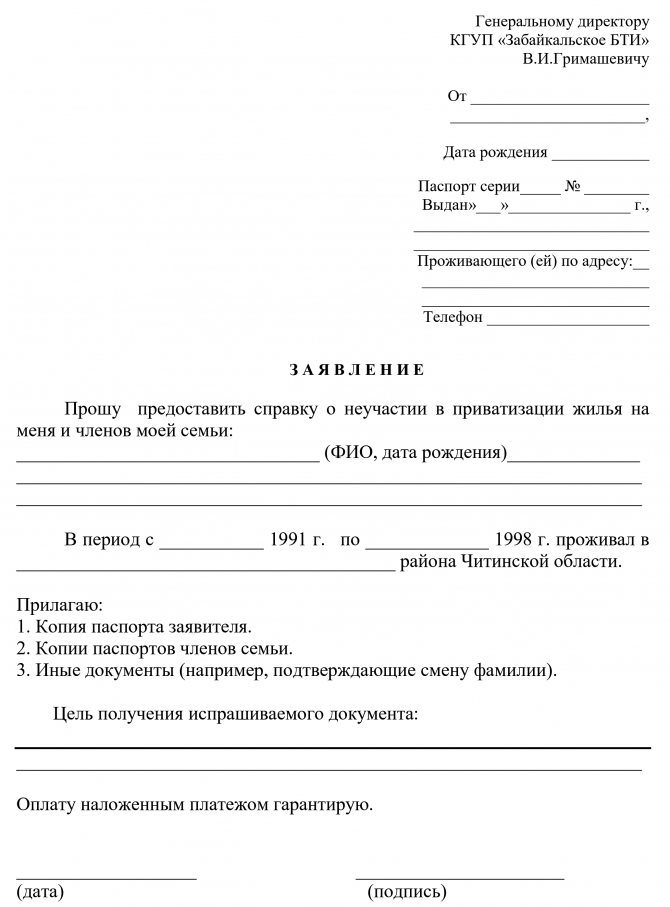
How to draw up and complete an application?
When contacting the relevant authority, the application is drawn up by the operator based on the documents submitted by the visitor. It states:
- information about the applicant;
- Contact details;
- request for information on participation/non-participation in privatization;
- date and signature of the applicant.
We do not recommend completing the documents yourself. Save time - contact our lawyers by phone:
8 (800) 302-76-94
How to get
To obtain an extract from the Unified State Register, you first need to carry out privatization. Within its framework, ownership of real estate will be formalized, which is reflected in this document.
Procedure
- Collect consent for privatization from all residents. If one of them cannot or does not want to participate in the procedure and is ready to lose his share, he must formalize a refusal to participate and have it notarized.
If a person does not agree to the privatization itself (and does not simply refuse to participate in the procedure), it will be impossible to formalize ownership rights. In such a situation, you will have to do your best to convince him and prove the advantages of your own real estate.
- Prepare documents.
- Visit the administration or branch of the MFC (now the more correct name is “My Documents”).
- Write an application for privatization and provide all the necessary documents.
- Wait for a decision (maximum waiting period is 2 months).
- Sign the privatization agreement.
- Register ownership in Rosreestr. At this step, the required extract from the Unified State Register is issued.
Delivery times and cost
The period for issuing a certificate is from 8 to 15 days from the date of receipt of the application at the MFC. In BTI the terms are up to 10 working days.
The service for issuing a certificate of participation/non-participation in privatization is provided free of charge according to the data from the State Services website. In authorities (Rosreestr, BTI), the cost may depend on regional requirements.
The certificate must be certified by the signature of the responsible person and the seal.
Sample certificate of non-participation in privatization:
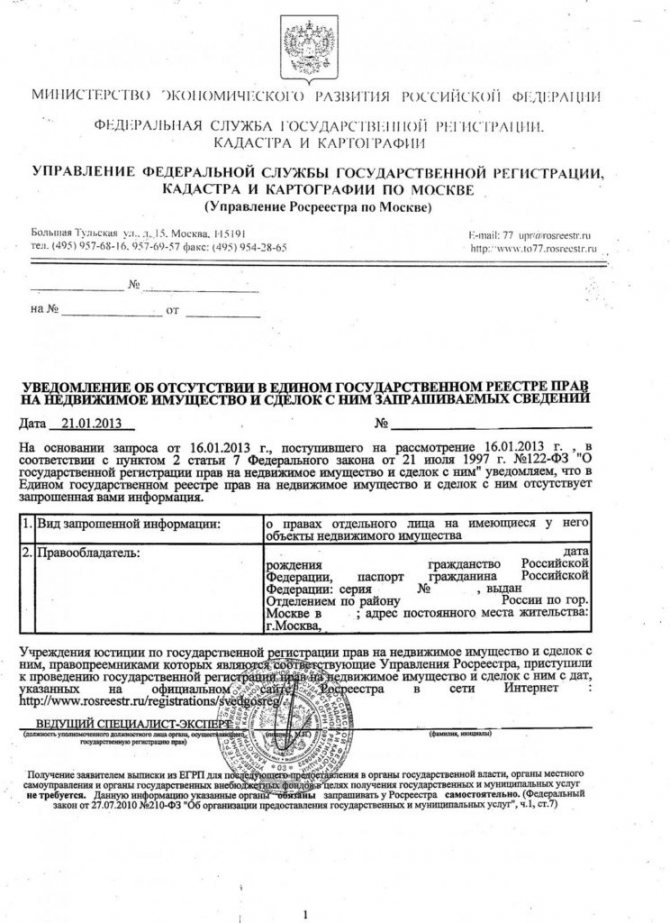
Cost and terms
The timing and cost of providing a certificate of non-participation in privatization may vary depending on which institution you contacted and how many residential addresses you have changed since 1991.
In the State Budgetary Institution "My Documents"
Obtaining a certificate from this institution will cost you absolutely free. You must come to any MFC branch with your passport and submit the appropriate application.
After 14 days (maybe more if you have changed your place of residence), you will be given an appointment and asked to appear for the required certificate.
In Rosreestr
This authority will take 10 days to consider your application, but you must pay a state fee of 300 rubles.
A passport or birth certificate must be attached to the application (if the privatization participant is a child under 14 years of age)
What documents will be needed
To obtain a certificate for privatization about non-participation in privatization, you must prepare the following documents:
- Statement. A mandatory document that can be written by hand or typed on a computer. If the application is submitted through the State Services portal, the user fills out the proposed form.
- Civil passport of the Russian Federation.
- Certificate of change in data (if the applicant’s full name has changed).
- Power of attorney (if applied through an authorized representative).
The application is written according to a standard format and consists of the following parts:
- A cap. The applicant’s personal and passport details and his telephone number are indicated here.
- The main part in which the applicant asks to be issued a certificate of non-participation in the privatization of real estate owned by municipal or state property.
- Signature and date.
Drawing up an application, collecting documents
First of all, you need to fill out an application for issuing a certificate, indicating the following information:
- the name of the organization to which the applicant is applying and its head;
- Full name and address of the applicant, date of birth;
- passport data: series, number, date of issue;
- residential address;
- telephone;
- please provide a certificate of non-participation in the privatization of housing for the applicant and his family members, if necessary, indicating their full name and date of birth;
- residential address from 1991 to 1998 (or other period);
- list of attached documentation;
- the purpose of obtaining a certificate of non-participation in privatization;
- date, signature of the applicant.
applications can be found at this link.
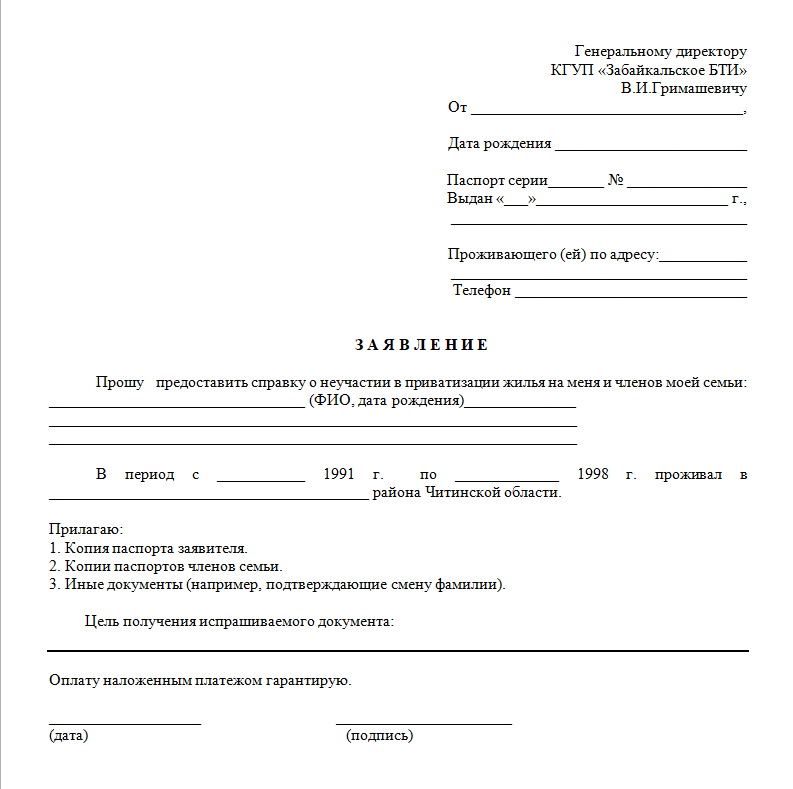
The following must be attached to the application:
- copies of passports of the applicant and his family members;
- an archival extract from the house register, which confirms registration from the previous place of residence;
- an extract from the house register about registration in the housing that is planned to be privatized;
- a copy of the child's birth certificate, certified by a notary.
Other documents may also be required - for example, about a change of surname during the registration of a marital union. If the applicant is a proxy, then he must have a notarized power of attorney with him.



